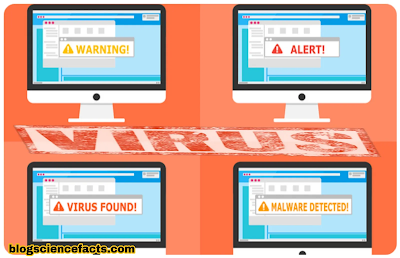Computer virus is an harmful program. Computer viruses enter the memory of a computer from an external source and spread it secretly in the memory. A virus is a program that infects itself as a destroyer / terrorist (ie part of its "executable") with other programs and periodically guarantees the spread of its destruction.
[ What is Hardware and Software??]
The full meaning of the word VIRUS, V = vital, I = information, R = resources, U = under, S = seize. (Vital information resources under seize)
It may be copied itself without the computer program or user's permission or idea. Like the metamorphic virus, they can copy the actual virus or the copies themselves may change. A virus can be transmitted from one computer to another, only when the infected computer is transported to the normal computer. For example, a user can send the virus through a net work or spread it through a portable medium such as a floppy disk, CD, USB drive or Internet.
How does the virus enter the computer?
Virus can be infiltrated into your computer or system for some simple reason. These are-
- USB devices - We often copy many types of files from our USB device, such as a pen drive, to another mobile, to a hard disk on our computer. And, while copying these files, the virus infiltrates easily from other computers on our computer and we do not understand.
- Email attachment - There are many different types of emails coming in to our mail id every day. And, the hope is that viruses can be inserted through file attachments in emails.
- Via Internet - If you use the Internet on a computer, viruses can be infected on your computer from many infected websites online. 90% of people have adware on their computer and malware, spyware virus is infected on the system from the Internet.
What are the types of computer viruses ?
There are many types of viruses. They are -
- 1. Malware - This type of system virus is created to harm your computer. Most of these are transmitted to your system when copying files from another computer and using an infected usb device.
- 2. Worms - These viruses are called self -replicating. I mean, they dig into your system and spread it slowly. They change their code in such a way that they are very difficult to find.
- 3. Trojans - This type of virus is spread and used by most hackers. By these, hackers can access your computer through internet, network origin and steal personal and confidential information.
- 4. Browser Hijackers - Computer viruses like this can be infiltrated into your system via "downloads". That means, when you download a file from the Internet, these viruses are infused with that file into your computer as "plugin" or "extension". And, then those viruses display many harmful ads on your web page or internet browser, popup ads, other websites open against your will.
- 5. Overwrite Viruses - These viruses can get into your computer, delete system files or any files. And, by deleting the files, they edit the files themselves and cause damage to your system.
- 6. Malware - This type of system virus is created to harm your computer. Most of these are transmitted to your system when copying files from another computer and using an infected usb device.
- 7. Spyware - Using spyware viruses, your computer and browser usage are monitored. They can be accessed on your system from most of the Internet.
- 8. Adware virus - These enter into your computer while downloading something from the Internet. In addition, some unsafe websites are automatically downloaded to your computer through popups containing these adware viruses. This virus enters your computer and automatically displays ads on ads that you cannot stop at any point.
So, above I mentioned some of the most common and most widely spread computer viruses. Most of all, it can come to your computer when you copy and paste files from the Internet and others.
How do you understand when a virus enters into a computer? (Symptoms of the virus)
Many times this happens, the virus is exposed to the system but it does not show any symptoms. Symptoms can be different for different viruses. It depends on his work and on what he was made to do.
As an example, If your computer is displaying ads automatically, pop-up pages are opened in the browser, there are other webpages or websites open, then it is possible that your computer has "Adware virus".
Most of the time, the virus sits inside your system and slowly edits the system or program files and places its code in it. For example, self -replicating viruses.
In this case, you will not be able to catch them but some common difficulties, such as restarting the computer itself, hanging too much, error message hope etc.
- Internet slowdown
- Hanging out in one place. (Sudden freeze and crash).
- Applications are automatically turned on or off.
- Show system error.
- Hardware or software problem available.
If you have these kind of difficulties thing that you are getting on your computer, then they may be signs of a virus in the computer.
You can install antivirus software on your computer and do a scan. If there is a virus, he will be diagnosed with a scan.
How do we protect computer from virus?
- Keeping up-to-date: All other applications, including the operating system of the computer, should be updated at all times. Every new virus is introduced to the cana. Which invades the computer when the application crawlies out. Application organizations prevent this error and bring new updates to the app. As a result, the computer will be protected if you use these updates. Every Tuesday Microsoft unveils new 'patches' to prevent malware or viruses. That's why Windows users should install this update to prevent the virus.
- Use of anti-virus software: Anti-virus software should be used to keep the computer virus free. However, not all anti-virus is good. In that case, the technology experts have suggested using Avast 25 as a free antivirus. Because this software has anti-spyware and anti-rootkit security feature, it is able to block most malware. However, you can use Norton, MacPhee and Kaspersky antivirus software if you want. Even with Microsoft Security Essentials or Windows Defender, PCs can be protected from malware attacks.
- Alerts for using email: The use of e-mail should be a warning. It's better not to download strangers' e-mail attachment files. Before downloading any file in e-mail, it should be thoroughly verified. Many viruses are now spread by mail.
Our last words,
Guys, you may have understood what or how the computer virus is. And, in the end, I would tell you that if you have a lot of personal data or files on your computer, you will definitely survive the virus.
You must use antivirus software on your system. Before copying files from others, see if the device is secure.
If you use the Internet, be alert to download files from any site. The Internet, the root of viruses and the many things you need to survive. General things to do to use Antivirus.







0 Comments